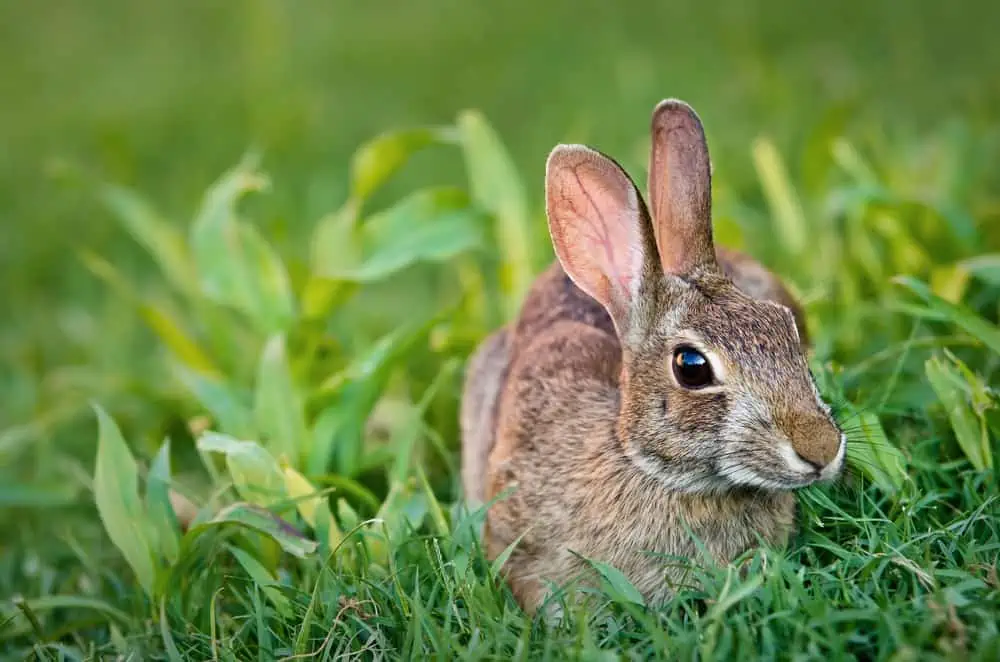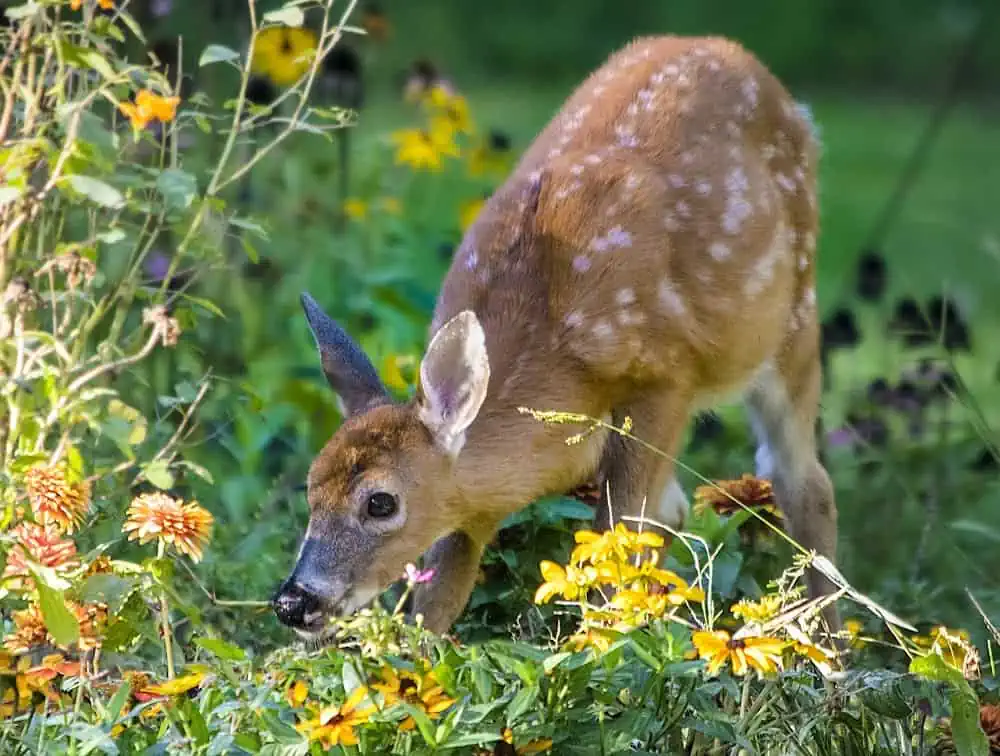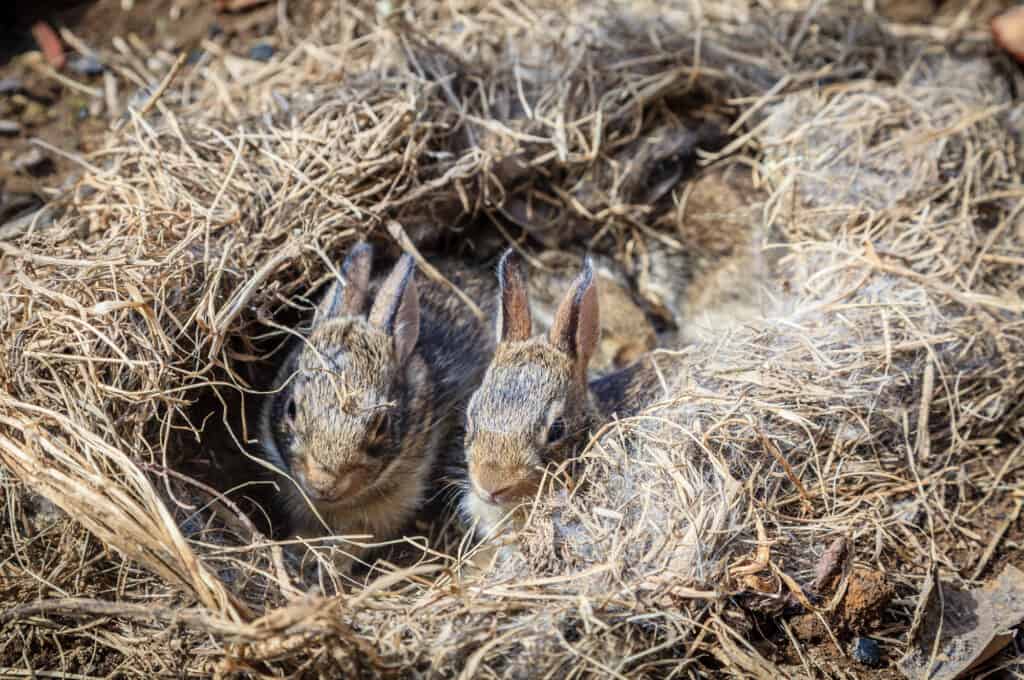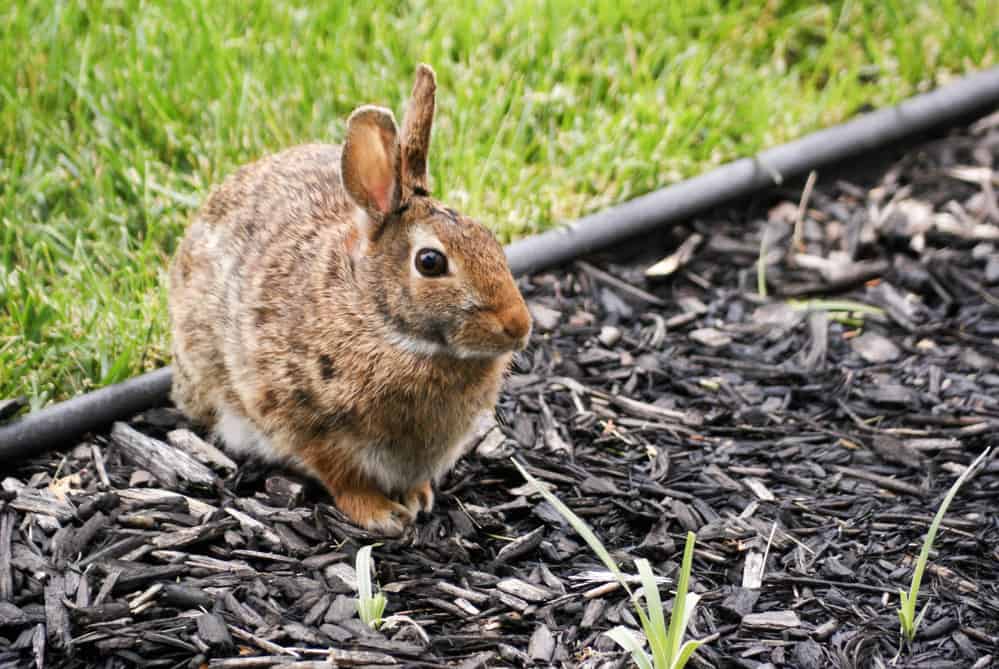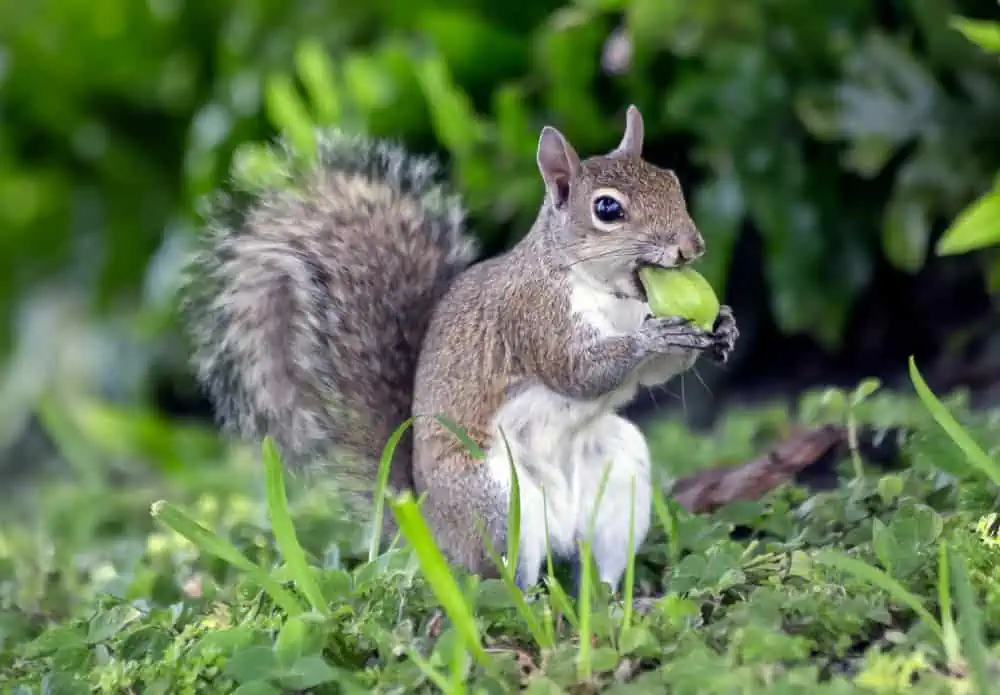How to Protect Gardens from Deer, Rabbits and Other Wildlife
Whether it’s a cute bunny, a hungry deer, or ornery ground squirrels, dealing with pests in the garden is just part of gardening (often, a very frustrating part of gardening!) Over my many years of gardening, I have learned how to protect gardens from deer, rabbits and other wildlife effectively and affordably.
While there are many, many remedies, nonsense and old wives’ tales out there, I will share what has worked for me without using a bunch of chemicals.
This post contains affiliate links. If you click on
one of the links and make a purchase,
I may receive a small commission at no additional cost to you.
See full disclosure here.
How to Keep Deer and Rabbits Out of the Garden
The best way to protect your vegetable gardens from deer, rabbits, and other animals is to keep them out of the garden as much as possible. This is the first line of defense and often a simple solution to keep unwanted garden visitors out of your growing space. And, yes, I realize in a lot of instances this is simply impossible. Read on though, because there are lots of helpful tips.
At our last home, we were a few blocks from a wildlife preserve, and when the deer ran out of things to eat there, or got bored with the menu, they paid a visit to my gardens.
All it took was a visit from one deer, and then every night, there would be two or more coming to dine. They weren’t really scared of humans, either. Even the headlights from our car pulling into the driveway would not deter them.
They would look up as if to greet us and then continue their feast. We had motion sensor lights in our backyard, but they became accustomed to those. I knew then that if I wanted to protect my gardens, I would have to learn how to deal with garden pests.
1. Install physical barriers
The first thing we did was to fence in our raised bed vegetable garden. We didn’t do anything fancy, and it wasn’t at all attractive, but once the vegetables grew and filled in, the fence wasn’t all that noticeable.
If you do use fencing, be sure the bottom of the fencing is small enough so that baby bunnies can’t sneak through… speaking from experience. And, make sure that the bottom is buried, so the little buggers can’t dig under it.
Chicken wire: Any wire mesh can be a great physical barrier to your garden space. You can add chicken wire directly around your garden beds as a fence or frame in the entire garden bed.
Row cover: Fabric row covers can help protect tender young plants from deer damage and nibbles from young rabbits. They’d need to eat through the fabric to reach the plants, which slows them down. Plus, a row cover can help deter insect pests, regulate temperatures, and aid in germination.
Electric fences: An electric fence is a powerful deterrent for the most persistent pest who don’t want to be shocked. This is a more costly solution, but it is highly effective.
Ultrasonic devices: Did you know some devices produce an off-putting, loud sound to deter animals? Place these ultrasonic animal deterrents throughout your garden to keep the critters out.
Motion-activated sprinklers: This is a classic solution for dealing with cats or other animals in the garden, and it also works well for rabbits and deer. The sprinklers activate when they sense movement, which will scare the animals off without harming them.
2. Start early
I knew I wasn’t going to fence in my entire yard, or my individual flower gardens, so I had to come up with an arsenal against the deer and rabbits that were feasting on my veritable smorgasbord.
This is very important; deterrents must be used starting very early in the spring, just as soon as you see little buds popping out of the ground.
After a long winter, wildlife are starving and looking for a food source. Be especially vigilant with tulips, lilies, liatris, bachelor’s buttons, black-eyed Susan, and many other delicious perennials.
I also recommend trying a few different solutions. For persistent pests, you may need to try several strategies to protect your plants. If you plan for a problem, it will be easier to prevent them in the long run.
3. Add scent
Animals are highly affected by smell; fortunately, many different odors put off the most common garden pests.
Bars of soap: A simple bar of soap, like Irish Spring, has a strong odor that rabbits can’t stand. You can shave the soap into flakes to sprinkle around your garden beds, hang the whole bars, or spray diluted soap on the plants your pests enjoy the most. As they take a nibble, they’ll experience an off-putting taste and move on to a more enjoyable snack.
Human hair: Next time you get a haircut or clean out your hairbrush, save the hair and add it to your garden. The deer will smell your pheromones and sense your presence. It’s best to stick the hair in nylon or another breathable fabric so the smell can escape, but the odor goes away after a few weeks.
Predator urine: Prey animals like deer and rabbits are exceptionally aware of predators, and one of the ways to know where predators are is to sniff out their waste. If you add a little human urine to your garden, the animals will know there is a predator nearby and feel less comfortable staying there. Haha, neither hubs or I would do this, but if you live out in the country with no neighbors, that might be a different story.
Hot red pepper spray: Did you know you can make your own deer repellent at home? If you simmer hot peppers and garlic in water, you can spray the spicy solution on a variety of plants. Like the soap, the flavor of the hot peppers will be extremely off-putting and cause the pests to find a new source of food. Test this on one plant, to make sure it doesn’t burn the plant foliage, before you spray your entire garden.
4. Eliminate potential shelters
It’s a good idea to look at your garden and identify any areas that animals could use as shelter. Do you have tall grass or brush piles?
These can be used by small mammals for housing, making your easy access, favorite plants a convenient midnight snack.
It can be helpful to keep your compost off the ground (try a rotating composter), burn or compost your brush pile quickly, and clear dead plants out of your garden plants sooner rather than later.
Products That Work To Keep Garden Pests (Wildlife) From Eating Your Plants
Here’s the thing with rabbits and deer, they become accustomed to smells and tastes, and their taste buds will adapt to yucky-tasting plants.
That means you’ve got to change things up or use multiple deterrents. I had the best luck using Milorganite, and alternating commercial repellents, Liquid Fence and Deer Off.
Milorganite
Milorganite is an organic fertilizer made from dried sewage. It sounds gross, but it works. If you get it on grass, it will turn it a rich, deep green. It is also the cheapest deterrent out there.
I’m sharing my Amazon Affiliate link, but you can probably get this product cheaper at your local big box store. It’s usually with lawn fertilizers. I use a funnel and create a line on the mulch around all my flower beds. It’s a great fertilizer too, rich in nitrogen.
Liquid Fence
Liquid Fence is a nasty concoction made with rotten eggs, garlic, and other crud that critters don’t care for. I need to warn you that it STINKS, and that is putting it mildly. The strong scent does dissipate, but the taste does not. Liquid Fence is my #1 go-to in my arsenal of wildlife deterrents, because it works!
It includes a wax product that makes it stick to the plant through rain. If you don’t shake the bottle well, the wax will leave cloudy white spots on the foliage once it has dried on the plant.
Also, the product label states that it’s effective for three months, but I don’t find that to be the case, and I usually reapply it after heavy rain. That being said, the white spots on the leaves and the need to reapply still make the cost of this product and the hassle of using it worth it because it works!
Save this pin to your favorite gardening board on Pinterest, so you can remember it later!
Deer Off
Deer Off is also made with rotten eggs and garlic, but it’s seasoned with hot pepper, which is off-putting to deer, rabbits and squirrels.
So by using Milorganite and alternating Liquid Fence and Deer Off, I can keep deer and rabbit damage to a minimum.
More Ways to Protect Gardens From Deer, Rabbits and Other Wildlife
There are so many ways to prevent major damage in your garden. Some methods are tried-and-true, but there are plenty of old wives’ tales too.
I’ve tried everything to keep the bunnies, deer, and squirrels away from my beloved plants! These are a few of the various products you can try to do just that.
Commercial repellents: I also used these stake things filled with some sort of nastiness in my hosta beds, and they seemed to work well for our summer growing season.
Blood meal: Made by drying animal blood to add nutrients to the soil, blood meal is also a great way to deter critters from your garden. It has an off-putting smell deer especially prefer to avoid.
Aluminum pie pans: This strategy is like making a scarecrow. If you hang metal pie pans or even old CDs, the reflection from the light can scare away critters.
Reflective tape: This product has two purposes in the garden. First, it adds light like the pie pans, but it also makes a loud rustling, snapping sound in the wind, making it sound like a predator nearby. It can also be used to keep birds out of the garden.
Cloches: Add cloches or cylinder-type fences around plants you know rabbits will eat, like tulips or lilies. I made up a bunch of cylinder fences from this type of fencing that works well. This is the one thing I have found to protect plants from baby bunnies. They are so cute, but baby bunnies will eat anything, no matter what you put on it.
Protecting Plants in the Winter from Deer and Rabbits
Deer and rabbits can do just as much, if not more, damage in the winter as they can in warmer months. When there’s nothing green in the winter, they will resort to chewing on the bark of trees and shrubs. I’m not sure why, but some winters are worse than others.
We used these tree trunk protectors for our younger trees. If you are in an area where you get lots of snow, you may have to double up.
For shrubs and evergreens, like arborvitae, use burlap wrap or shrub protector jackets.
Grow Animal-Resistant Plants
If you’re in an area with lots of wildlife in your yard, there are many perennials that deer and rabbits don’t particularly care for. I compiled a list of 30+ Rabbit & Deer Resistant Perennials available in the Gardening Resources Library. Complete the form below to gain immediate access.
The list is divided by Shade/Part Shade Plants and Sun/Part Sun Plants. I recommend doing a little research on deer-resistant plants and rabbit resistant plants in your gardening zone. By taking just a few minutes, you’ll come up with a good list of plants to try.
Some great options include: Shasta daisy, bee balm, lamb’s ear, and many more. Check out the resource to find more rabbit and deer-proof plants for your garden.
Tips for Keeping Squirrels from Digging In Your Garden
Squirrels are my garden nemesis now. I am okay with if they dig in the lawn, but not my gardens or my planters.
Squirrels also love to eat certain flowers. They’ve eaten my gazanias for the past three summers. No matter where I put them, the squirrels will find a way to get to them and eat them.
I’ve read that the product Plantskydd works well to keep squirrels and other garden critters away.
Cayenne pepper or cinnamon work amazingly to deter squirrels. I use cinnamon in my planters, and yes, it keeps the little brats out, but it does need to be reapplied. Once the plants fill in and the soil isn’t showing, squirrels are less likely to dig.
I can’t really visualize sprinkling cinnamon all around my entire garden. However, I will sprinkle it around freshly planted annuals. Also, after planting a new plant, if you mulch around it, so that it doesn’t look like something just dug there, squirrels are more likely to leave it along.
Have you had success keeping squirrels from digging in your gardens? If so, please leave a comment and let us know your secrets.
A Few More Tips to Protect Gardens from Deer, Rabbits and Other Wildlife
If you have a rabbit problem, keep a patch of lawn covered with clover just for the rabbits. I know it sounds crazy, but we don’t do anything special to our back lawn so it has a lot of clover. Something I have noticed is that the bunnies much prefer clover over anything in my gardens. Just try it and I think you’ll agree.
If you have a short growing season like I do, it’s incredibly frustrating to see that tender new growth destroyed by roving rabbits or deer. Fortunately, you can use many strategies to protect your flowers, edible plants, and fruit trees from the critters. Start by securing your garden as much as possible, like installing a proper deer fence or electric fencing. Then, spot-treat affected areas using natural deer repellents like sprays, pie pans, or other gadgets to intimidate the creatures to move on to somewhere new.
With a bit of planning and persistence, you can enjoy a beautiful garden while keeping deer, bunnies, and other animals out of your garden.
Happy gardening,
Joanna
More Great Things on Gingham Gardens
Sign up to receive our weekly newsletters full of gardening tips. You’ll also get access to our Gardening Resources Library and all our helpful gardening printables.
More places to find Gingham Gardens:
- Visit Gingham Gardens on Pinterest.
- If you’re on Facebook, Gingham Gardens is also on Facebook.
- Stop by Gingham Gardens’ Amazon store!
- Love Etsy? Come see us on Etsy too.
Save a pin to your gardening board on Pinterest, so you can remember this post later:


